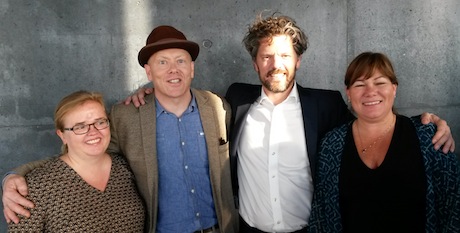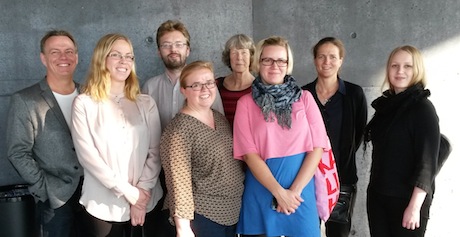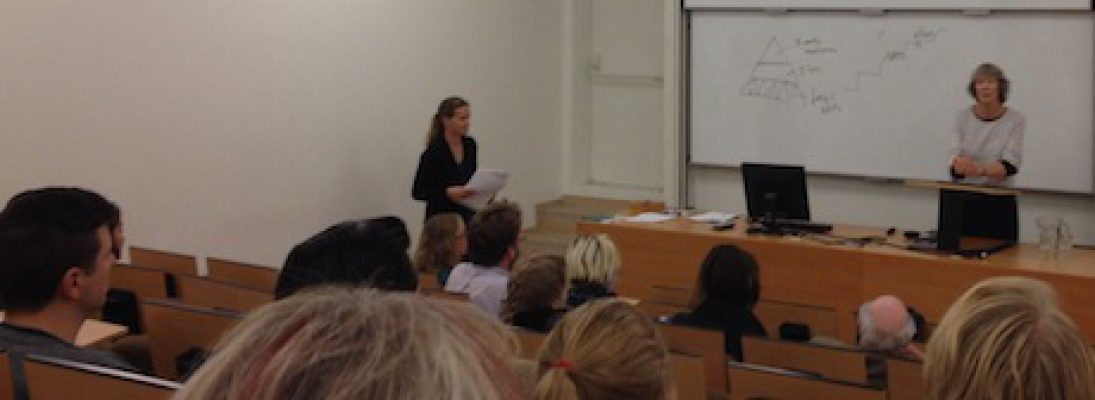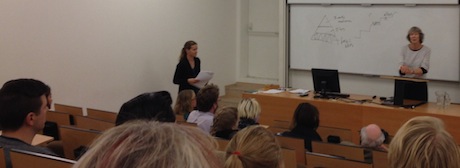Barbara Sivertsen from the Norwegian peace council continued on the same theme by presenting what has been achieved by the Norwegian mediation agencies. Statistics from 2013 show that more than 90% of the mediated cases led to an agreement between the parties. Approximately 80% of the participants answered that they felt that they had been given opportunity to express what was important to them, and that after the mediation the whole issue was either out of the way or had developed in a positive way.
Barabara further spoke on skillsets needed for a better world and how they have to be trained in practice, unlike for example academic knowledge. A fundamental principle is learning how to interpret and understand one’s own feelings and take responsibility for them. It is not a given that a certain external incident automatically leads to anger and frustration. Rather, getting angry is an internal process, related to a need that is not fulfilled. This inner need has to be identifies and expressed without provoking the receiver. Barbara also spoke about the regular conflict patterns, which are the same for individuals as well as for international conflicts.
Sue Gollifer, a graduate student at the pedagogical faculty of University of Iceland, spoke about critical pedagogy as an opportunity to encourage peace and justice. Sue drew from her research, where she examines the stories of Icelandic teachers, their perspectives and their understanding of their role as teachers and their work with social equality and human rights in school. Peace, justice and human rights are abstract and contested concepts and may be difficult to relate to and to work with. According to Sue Gollifer, critical pedagogy may be a valuable tool for handling these difficulties. Sue showed, among other things, the importance for both teacher and students to be aware of their own values and the societal values around them, as well as to critically discussing and examining them. Furthermore Sue spoke of the importance of being able to look at ones own culture and society and observe it from above, in order to be able to see that norms we may take for are not that self-evident after all – there are many different ways of looking at life.
Lastly, Birger Norup from Global Alliances for Ministries and Infrastractures for peace/Peace Alliance Denmark spoke about research and how to use HearthMath as a method for stress management, increased wellbeing and as a tool in conflict management. HearthMath is based on research on the connection between heart and brain. Research shows that our heart rhythm changes depending on whether we have positive or negative feelings in our bodies. There are methods and technical tools that can be used to train us in adjusting our feelings and reduce our stress levels, at the same time as we see the physiological effects on our heart. Hearthmath has been used in projects in both Costa Rica and in Belfast.
Moderator Susann Simolin from the Åland Islands Peace Institute (ÅIPI) concluded that all speakers brought up the importance of observing, listening and decoding our own and other’s needs as well as agendas. Thus, having access to a distanced perspective on oneself, others and societal norms is key in order to being able to handle conflicts in a constructive manner. All speakers also emphasized the importance of different kinds of knowledge, not only academic and theoretical knowledge, but also the abilities we need to internalize in order to react in adequate ways when we are faced with a potential conflict.
During their stay on Iceland the project partners participated in the annual prize ceremony where Yoko Ono gives out the Lennon/Ono Peace Award. During the ceremony good news were delivered: The University of Iceland has been given resources to found a center for peace studies. It was especially joyous that the network got to participate at the ceremony, since the project’s main contact person on Iceland, Silja Bára Ómarsdottir, has been working for this together with Reykjavik’s former mayor and one of this years Lennon/Ono award recipients, Jón Gnarr.

From the left: Silja Bára Ómarsdottir, researcher at University of Iceland. Reikjavík’s former mayor Jón Gnarr, current mayor Dagur Bergþóruson Eggertsson and Pia Hansson, director of the Institute of inernational affairs at the Univeristy of Iceland.
The project “Norden for Peace?” started in September 2013. The project is led by the Åland Islands Peace Institute and is financed by the Nordplus adult programme. Participating in the network are the Peace Union of Finland, the Norwegian Peace Council, Peace Alliance Denmark, The Norden Association Sweden and the Institute of International Affairs at the University of Iceland.

From the left: Birger Norup GAMIP/Peace Alliance Denmark, Ida Persson, The Åland Island’s Mediation Office, Fredrik Harstad, Norden Association Sweden, Silja Bára Ómarsdottir, The University of Iceland, Barbara Sivertsen, the Norwegian Peace Council, Elise-Marianne Åberg, The Norden Youth Association Sweden, Susann Simolin, The Åland Islands Peace Institute and Tuuli Vuori, The Peace Union of Finland.
This was the third time the network gathered. The first meeting was held in Denmark in September 2013 where foreign policy and university education was discussed. The second meeting took place on the Åland Islands in March 2014, where the participants discussed the theme “Norden and peace”, both amongst themselves, but also in front of an audience. The next network meeting will be held in Norway on 17-19 April 2015. The final seminar will be held in Sweden in October 2015, under the guidance of the Norden Association Sweden. This last seminar will discuss peace as an identity marker for the Nordic countries and within the Nordic collaboration.
The six partner organisations in “Norden for Peace?” all work in their own ways for a more peaceful and less violent world and agree on that the Nordic experiences can be used in that work. The organizations furthermore mean that the peaceful experiences and peace profile of the Nordic countries receive too little attention in the current debate, especially in relation to safety and defence questions. The Nordic countries and peace therefore need to be discussed further in all Nordic countries and within the Nordic collaboration.
The aim of the project is to raise questions about the Nordic countries and their relationship with peace – how peaceful are we, and how may peaceful experiences be strengthened and spread?
Susann Simolin, project manager and information officer at The Åland Islands Peace Institute
Read the complete text as a PDF here.





